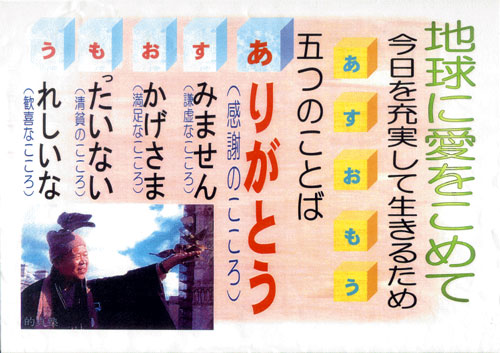Zen-people are sometimes suspected that their strong focus on what they do “right know” makes them ignore the long-term effect of their actions. Always when I visit the Kyoto Kokusai Zendo, I see a poster hanging at the wall with words from the Temple’s head priest Hozumi Roshi:
The headline あすおもう (asu omou) can be translated as “let’s think of tomorrow”, with the five Japanese syllables a-su-o-mo-u standing for:
- ありがとう – I am grateful
- すみません – I apologise
- おかげさま – I am content with what I have
- もったいない – I won’t waste
- うれしいな – I am so glad
Acting in that way moment by moment, we can enjoy a happy life while acting responsible with the resources we just borrowed from our next generations.
I was shocked (but not surprised) to read yesterday that high levels of toxic strontium-90 have been found in groundwater at the devastated Fukushima nuclear power plant. The radioactive isotope strontium-90 has a half-life of 28.8 years (that means: after 28.8 years still 50% remain) and is mainly accumulated in the bones of the human body, where it can can cause bone cancer, cancer of nearby tissues, and leukemia. It is not mentioned as a health danger as frequently as the radioactive caesium-137, because luckily it is much less volatile after a nuclear accident. But Tepco recently planned to release huge amounts of that radioactive water into the sea …
What else do these experts plan?
Let us share forces to stop that! Let us conduct our life moment by moment considering あすおもう (asu omou)!

Comments are closed, but trackbacks and pingbacks are open.